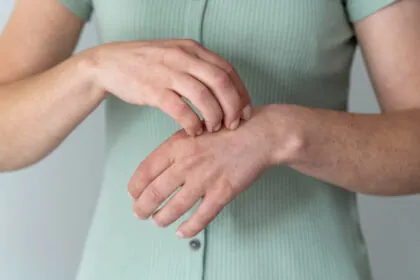Hormones are chemical messengers that regulate many functions and processes in your body, such as metabolism, reproduction, mood, and sleep.
When your hormones are in balance, your body works as it should.
But when your hormones are out of balance, you may experience a variety of symptoms and health problems.
Hormonal imbalance can affect anyone, regardless of age, gender, or lifestyle.
It can be caused by many factors, such as genetics, stress, diet, medications, environmental toxins, or medical conditions.
Some hormonal imbalances are temporary and resolve on their own, while others are chronic and require treatment.
In this blog post, we will explore some of the most common types of hormonal imbalances, how to recognize their signs and symptoms, and how to treat them naturally or with medical interventions.
Types of hormonal imbalances
There are over 50 hormones in the human body, and each one has a specific role and function.
Some of the most important hormones are:
Thyroid hormones:
These hormones control your metabolism, energy, growth, and development.
They are produced by the thyroid gland, a butterfly-shaped organ in your neck.
When your thyroid hormones are too high (hyperthyroidism) or too low (hypothyroidism), you may experience symptoms such as weight changes, fatigue, mood swings, hair loss, or irregular periods.
Sex hormones:
These hormones control your sexual development, function, and reproduction.
They include estrogen, progesterone, and testosterone, which are produced by the ovaries in people assigned female at birth (AFAB) and by the testes in people assigned male at birth (AMAB).
When your sex hormones are too high or too low, you may experience symptoms such as acne, low libido, infertility, erectile dysfunction, or menstrual problems.
Adrenal hormones:
These hormones help your body cope with stress, regulate blood pressure, and maintain fluid and electrolyte balance.
They include cortisol, adrenaline, and aldosterone, which are produced by the adrenal glands, small organs that sit on top of your kidneys.
When your adrenal hormones are too high or too low, you may experience symptoms such as anxiety, insomnia, weight gain, high blood pressure, or low blood sugar.
Growth hormone:
This hormone stimulates your growth and repair of tissues and organs.
It is produced by the pituitary gland, a pea-sized organ at the base of your brain.
When your growth hormone is too high or too low, you may experience symptoms such as abnormal growth, muscle weakness, or osteoporosis.
Insulin:
This hormone regulates your blood sugar levels and helps your body use glucose for energy.
It is produced by the pancreas, a gland behind your stomach. When your insulin is too high or too low, you may experience symptoms such as hunger, thirst, frequent urination, or diabetes.
Signs and symptoms of hormonal imbalance
Hormonal imbalance can cause a wide range of signs and symptoms, depending on which hormones are affected and how much they are out of balance.
Some of the common signs and symptoms of hormonal imbalance are:
- Weight gain or loss
- Fatigue or insomnia
- Mood swings or depression
- Anxiety or irritability
- Headaches or migraines
- Hot flashes or night sweats
- Hair loss or thinning
- Dry skin or acne
- Low libido or erectile dysfunction
- Infertility or irregular periods
- Breast tenderness or enlargement
- Hirsutism (excess hair growth) or alopecia (hair loss)
- Osteoporosis or joint pain
- Memory loss or brain fog
- Changes in appetite or cravings
- Digestive problems or bloating
- Allergies or asthma
- Infections or inflammation
Keep in mind that these signs and symptoms are not specific to hormonal imbalance and may be caused by other factors or conditions.
Therefore, it is important to consult your doctor if you notice any changes in your body or health that concern you.
Causes of hormonal imbalance
Hormonal imbalance can have many possible causes, some of which are:
Genetics:
Some people are born with genetic disorders that affect their hormone production or function, such as congenital adrenal hyperplasia, Klinefelter syndrome, or Turner syndrome.
Stress can trigger the release of cortisol and adrenaline, which can disrupt the balance of other hormones, such as thyroid, sex, and growth hormones.
Diet:
Diet can influence your hormone levels, especially insulin, which is affected by the amount and type of carbohydrates you consume.
Eating too much sugar, refined carbs, or processed foods can cause insulin resistance, which can lead to diabetes and other hormonal problems.
Eating too little calories, fat, or protein can also affect your hormone production and function.
Medications:
Medications can interfere with your hormone levels, either by increasing or decreasing them.
Some of the medications that can cause hormonal imbalance are birth control pills, hormone replacement therapy, steroids, antidepressants, or thyroid medications.
Environmental toxins:
Environmental toxins can mimic or block your hormones, affecting their balance and activity.
Some of the toxins that can cause hormonal imbalance are pesticides, plastics, metals, or endocrine-disrupting chemicals (EDCs), which are found in many household and personal care products.
Medical conditions:
Medical conditions can affect your hormone levels, either by damaging your endocrine glands or by altering their feedback mechanisms.
Some of the conditions that can cause hormonal imbalance are thyroid disorders, polycystic ovary syndrome (PCOS), diabetes, Cushing’s syndrome, Addison’s disease, or pituitary tumors.
Diagnosis
To diagnose hormonal imbalance, your doctor will ask you about your medical history, your symptoms, and your lifestyle.
They will also perform a physical examination and check for signs of hormonal imbalance, such as weight changes, hair growth or loss, or skin changes.
Your doctor may also order some tests to measure your hormone levels, such as:
Blood tests:
These tests can check the levels of various hormones in your blood, such as thyroid, sex, adrenal, growth, or insulin hormones.
Urine tests:
These tests can check the levels of some hormones or their metabolites in your urine, such as cortisol, adrenaline, or estrogen.
Saliva tests:
These tests can check the levels of some hormones or their metabolites in your saliva, such as cortisol, testosterone, or progesterone.
Imaging tests:
These tests can show the size and shape of your endocrine glands and detect any abnormalities, such as nodules, cysts, or tumors.
Some of the imaging tests that can be used are ultrasound, X-ray, CT scan, MRI scan, or nuclear scan.
Treatment of hormonal imbalance
The treatment of hormonal imbalance depends on the cause, the type, and the severity of the imbalance.
Some of the common treatments are:
Medication:
Medication can be used to replace or supplement the hormones that are deficient or to block or reduce the hormones that are excessive.
Some of the medications that can be used are thyroid hormones, estrogen, progesterone, testosterone, cortisol, growth hormone, or insulin.
Surgery:
Surgery can be used to remove or treat the endocrine glands or tissues that are causing the hormonal imbalance, such as the thyroid, the ovaries, the testes, the adrenal glands, or the pituitary gland.
Radiation: Radiation can be used to destroy or shrink the endocrine glands or tissues that are causing the hormonal imbalance, such as the thyroid or the pituitary gland.
Lifestyle changes:
Lifestyle changes can help improve your hormone balance and your overall health.
Such as:
- Eating a balanced diet.
- Exercising regularly.
- Managing stress.
- Quitting smoking.
- Limiting alcohol and caffeine.
- Avoiding environmental toxins.
Natural remedies for hormonal imbalance
Some people may prefer to use natural remedies to treat their hormonal imbalance, either alone or in combination with conventional treatments.
However, it is important to consult your doctor before using any natural remedies, as they may have side effects or interactions with other medications or supplements.
Some of the natural remedies that may help with hormonal imbalance are:
Herbs:
Some herbs may have hormone-like effects or may influence your hormone production or function.
Some of the herbs that may help with hormonal imbalance are black cohosh, chasteberry, maca, ashwagandha, ginseng, or licorice.
Supplements: Some supplements may provide nutrients or substances that are essential for your hormone synthesis or activity.
Some of the supplements that may help with hormonal imbalance are omega-3 fatty acids, magnesium, zinc, vitamin D, vitamin B12, or probiotics.
Acupuncture:
Acupuncture is a traditional Chinese medicine technique that involves inserting thin needles into specific points on your body to stimulate your energy flow and balance your hormones.
Homeopathy:
Homeopathy is a system of alternative medicine that uses highly diluted substances to stimulate your body’s natural healing response and restore your hormone balance.
Aromatherapy:
Aromatherapy is the use of essential oils to enhance your mood, health, and well-being.
Some essential oils may have hormone-like effects or may influence your hormone production or function.
Some of the essential oils that may help with hormonal imbalance are lavender, clary sage, rose, geranium, or ylang-ylang.
Conclusion
Hormonal imbalance is a common condition that can affect anyone, regardless of age, gender, or lifestyle.
It can cause a variety of symptoms and health problems, depending on which hormones are out of balance and how much they are out of balance.
FAQs
What causes hormonal imbalance?
Hormonal imbalance can result from various factors such as stress, age, certain medical conditions, medications, and lifestyle choices.
Conditions like polycystic ovary syndrome (PCOS), thyroid disorders, and hormonal changes during menopause or pregnancy can also contribute to hormonal imbalances.
What are the common symptoms of hormonal imbalance?
Symptoms of hormonal imbalance can include irregular periods, mood swings, fatigue, weight gain or loss, changes in sleep patterns, decreased libido, and skin issues.
Individuals may also experience hot flashes, hair loss, and disruptions in menstrual cycles due to hormonal fluctuations.
Can hormonal imbalance affect both men and women?
Yes, hormonal imbalance can affect both men and women.
While women commonly experience hormonal fluctuations during menstruation, pregnancy, and menopause.
Men may also face imbalances in testosterone and other hormones, impacting mood, energy levels, and sexual health.
How is hormonal imbalance diagnosed?
Diagnosing hormonal imbalance involves a thorough assessment of symptoms, medical history, and often blood tests to measure hormone levels.
Hormonal assays can identify imbalances in hormones like estrogen, progesterone, testosterone, thyroid hormones, and cortisol, providing valuable information for diagnosis.
What are the available treatments for hormonal imbalance?
Treatment for hormonal imbalance depends on the underlying cause and severity. Lifestyle changes, such as a balanced diet, regular exercise, and stress management, can be beneficial.
Hormone replacement therapy (HRT), medications, and specific treatments targeting the root cause, such as insulin-sensitizing drugs for PCOS, are also options.
Are there natural remedies to manage hormonal imbalance?
Yes, certain lifestyle changes and natural remedies can help manage hormonal imbalance.
These include maintaining a healthy diet rich in nutrients, getting regular exercise, practicing stress-reduction techniques like meditation and yoga, ensuring adequate sleep, and avoiding excessive alcohol and caffeine consumption.
Remember to consult with a healthcare professional for personalized advice and treatment options based on your specific hormonal profile and health condition.





